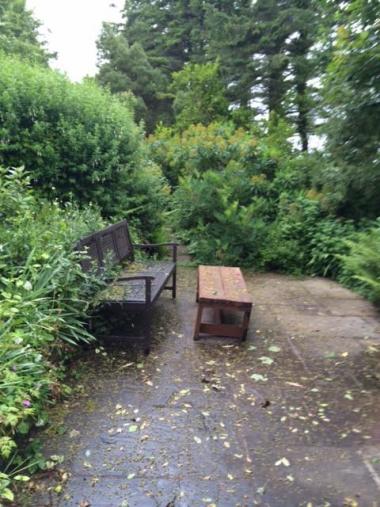Obsessed with the magic of words—their essence and their sound—I fell in love with the word de cid u ous when it fortuitously crossed my path. I embedded it like a seed. I imagined it as a poem. Its very sound parallels its meaning: a falling off, a shedding that also implies a continuing, a renewal - dying yet deathless.
I love the thought of deciduous parts of trees, of shrubs, of insects. I live in the Eastern United States where we have full seasons (or did before climate change). With luck, our trees turn brilliant shades of colors in autumn. Autumn brings shedding of leaves, suggests an in-between essence. As leaves begin to turn and fall, the earth feels as though a portal has been opened between this world and the next, between life and death. Autumn is a time of mystery.
“Migratory,” a poem by Les Murray, inspired “Deciduous.” A poet whom I adore, Murray writes penetratingly complex poems that are singular, forceful. Echoing the natural world, Murray’s poems are grounded yet otherworldly─pushing deeper into mystery by peeling back the layers to reveal inner essence. A line from “Migratory” reads: ”I am the right feeling on washed shine” (From: Learning Human: New Selected Poems/ ”Migratory”). Murray leaves me with a strange but right feeling, a clarity rendered violently, as though I’d been struck in the head.
I wrote “Deciduous” as part of my MFA for Carlow University, a dual-residency program in Pittsburgh and Ireland. The poet Mark Roper, my Carlow mentor in Ireland, introduced me to the sprawl of Murray’s Learning Human collection where I discovered the unforgettable “Migratory.” Like all poets, I practiced the art of thievery in trying to imitate Murray’s individualism. I wanted to know how “Migratory” managed to suggest so much at once, yet render strange stillness and clarity.
Mark Roper, an exceptional poet and editor, taught me the importance of tension between content and form; I followed Murray’s form narrating in the first person. I tried to evoke a strangeness similar to his personification in “Migratory.” “Migratory” was right-hand justified that added power and made it look like a flight pattern. My poem is also about cyclical patterns in nature, patterns of continuous death and rebirth. The use of right-hand justifying heightened the tension in Murray’s poem as I hope it does in mine.
“The Quality of Sprawl” is another Learning Human poem to which I return. There’s a pulling and twisting in Murray’s poems and in the process, violent friction occurs. Murray is a master of linguistic sprawl, of fantastic phrasings and word constructions such as “feedy sea” and “beak-focused” in “Migratory.” Murray’s strange linguistic patterns have the effect of individualizing language to render the particular. I tried to approach the particular in “Deciduous” similarly with phrasing like “the forest in refuge.”
I wrote this blog immediately after a master class in Ireland with the esteemed poet and editor Thomas McCarthy. Tom began our workshop with a quote from Goethe that as poets we “must do some sort of violence to ourselves to get beyond the mere general idea.” The exact quote, in part, (courtesy of the indomitable Thomas McCarthy), reads as follows: “The really high and difficult part of art is the apprehension of what is individual -characteristic. The young poet must do some sort of violence to himself to get out of the mere general idea. No doubt this is difficult; but it is the very life of art. Besides, when you content yourself with generalities, any one can imitate you; but in the particular, no one can.” (From: The Wisdom of Goethe, Poetry as Individualism, edited by John Stuart Blackie. Edinburgh, 1883).
To paraphrase Goethe: in particulars, no one can imitate Les Murray. My poem is a homage to his. Nature provides us with an ongoing living poem at once general and particular. Violence is something we see in nature and grapple with in our daily lives. At its core, human experience is coupled with violence, a constant rendering of mysteries: from the body’s mortal capacity for injury and healing, to its sexual renderings, to childbirth, and eventually to death. The natural world is continually doing violence to itself. It’s the particulars of that violence that give rise to nature’s inimitably.
There is inherent violence in the cyclical shedding of deciduous trees and plants, in the regrowth of leaves and in the migratory patterns of birds. No two leaves of a deciduous tree color in exactly the same way or fall at exactly the same time each year. No two species of birds nest and migrate identically. Yet as Goethe notes, “there is repetition everywhere.” Like Murray, I used linguistic patterns of repetition throughout “Deciduous” to suggest the sameness in natural cycles but also as an attempt to grasp nature’s particular violence, “the place of meristem division.” In grasping nature’s characteristic violence, I hoped to penetrate my humanness.
I wrote “Deciduous” in response to what I see as nature’s ever present rawness, a difference rendered forcefully from natural continuum. Deciduous led me to the words “meristem” and “cambium,” lyrical words not often heard. “Meristem,” the plant tissue whose cells divide and differentiate to form plant life, sounds like division, implies a falling off in sound; a leveling. Contrastingly, “cambium,” the layer of meristem tissue where all secondary plant growth originates, sounds circular, continuous. The inconstancy of words and their power to reflect the concrete and an in-between essence, death and deathless, make language by nature impermanent, deciduous.
Poets fall in love with words. They fall in love with other poets. I fell in love with the word deciduous and with the sprawling genius of Les Murray. With the word came a poem seed, cultivated by Murray’s feedy nourishment; the seed grew into “Deciduous.” Goethe wrote that “representation becomes more perfect the more closely it vies with nature.” As living creatures on a living planet, we look to nature to understand existence. Nature is our first mirror. “Deciduous” is my attempt to get at the heart of something inconstant, deathless. Les Murray, interviewed by the late Dennis O’Driscoll in The Paris Review (No. 89/”The Art of Poetry”) said, “there is a point when the poem has lost its magical intimacy with you and becomes an external object.” In writing “Deciduous,” I externalized nature to come to grips with a deathlessness inherent to human existence, to embody my own inner violence.
Deciduous
After Les Murray
I am the seed that roots and spreads,
I am the underbough unbearing.
I am the meristem, the forest in refuge,
the division in moss and the division in fern.
I am the absence of sound in deep rise,
in snow-buried mound, in matter-of-fact serration,
the feeling of stillness, that widens
and widens, then rustles and spills
from forked tongue to tadpole-spitting stream.
I am boundlessness of now, when it
is good to bear nothing but the weight
of its great vastness, while winters
pass from absence to deafening gathering
to absence again, many re-births
and sprawling coverings, till the falling ahead
becomes the falling behind, and half
the short seasons of the day are sameness.
Widening pools cast my perpetual echo,
I am bark of skin dividing out,
I am winged vertebrate weaving,
I am cambium, the forest in refuge,
the division in fern the place
of meristem division.
Tess Barry (MA in English, University of Pittsburgh; MFA in Poetry, Carlow University) teaches English and creative writing at Robert Morris University in Pittsburgh. She was a finalist for the 2013 Poetry Award, Aesthetica Magazine (England), and a 2012 and 2013 finalist for North American Review’s James Hearst Poetry Prize. Her manuscript Spring Barrel is being submitted for publication. Tess was featured in the Spring 2014 issue.
The image accompanying this blog was taken by the author in May 2014. It is a photograph of a bench that rests beneath and faces a deciduous Sycamore tree in the lower garden of Molly Keane’s Writers Retreat Center in Ardmore, Ireland (a writing retreat center operated by the late writer’s daughter, Virginia Brownlow, www.mollykeanewritersretreats.com).



